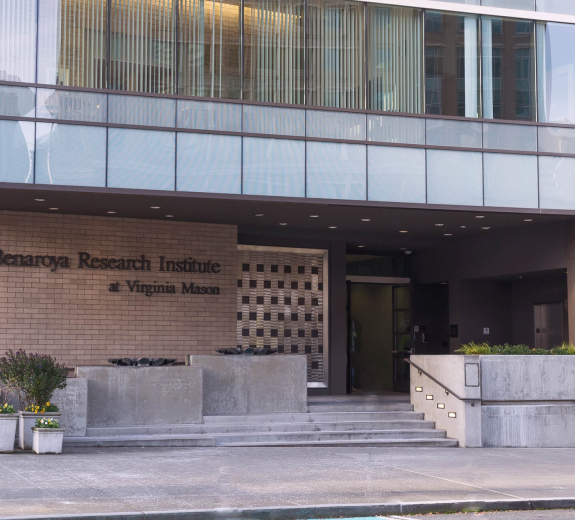
Benaroya Research Institute Awarded $4.1 Million National Institutes of Health Grant to Study Regulatory T Cells’ Function in Immune System Homeostasis
Researchers received four awards totaling more than $5 million in Q4 2023
Today, Benaroya Research Institute (BRI) announced its reception of four grants totaling more than $5 million awarded in late 2023, including a $4,146,476 award to study how regulatory T cells (Tregs) prevent the immune system from overreacting to harmless substances and reacting to the body’s own cells, which occurs in people living with autoimmune disease.
The five-year grant, titled “Regulatory T Cells Maintain Immune Homeostasis Through Translation Control,” is led by BRI’s Steven Ziegler, PhD, and Jane Buckner, MD, as well as Ram Savan, PhD, of the University of Washington. The team will investigate how Tregs suppress protein synthesis, which prevents cell division and ultimately shuts down T cells that promote inflammation. They are also seeking to identify if this process is disrupted in people living with autoimmune disease by studying immune cells isolated from people with type 1 diabetes and multiple sclerosis. Ultimately, the group aims to further the understanding of how Tregs function and how this function is altered in the context of autoimmune disease. The grant is sponsored by the National Institutes of Health — National Institute of Allergy and Infectious Diseases (R01AI181275).
In addition to this award, BRI team members received three other grants supporting research into inflammatory bowel disease, multiple sclerosis and type 1 diabetes:
DCs as Clinical Targets of Anti-Integrin Therapy in IBD
Adam Lacy-Hulbert, PhD, and James Lord, MD, PhD
$450,580
Vedolizumab, an anti-integrin α4β7 therapy, has been effective and safe for managing inflammatory bowel disease (IBD), including Crohn’s disease and ulcerative colitis — relatively common, chronic and incurable immune-mediated diseases of the intestines. However, for unknown reasons, many IBD patients do not respond to this therapy. Recent research suggests that this medication influences a type of immune cell in the gut called dendritic cells (DCs), rather than T cells, as had been widely suspected. By studying these DCs more closely, especially how they react to vedolizumab, BRI aims to better predict who will benefit from this treatment and optimize the efficacy of this therapy. The team will perform a detailed analysis of DCs from IBD patients’ blood and colonic mucosa to assess for the presence or absence of inflammation and, more specifically, how vedolizumab induces remission in IBD.
Sponsor: National Institutes of Health — National Institute of Allergy and Infectious Diseases (R21AI176365)
Modulation of Pathogenic T Cells in EAE
Estelle Bettelli, PhD
$450,580
Multiple sclerosis (MS) is a disease characterized by inflammation, demyelination and neurodegeneration of the central nervous system (CNS). CD4+ T cells are important actors in the development and progression of CNS-specific autoimmunity. IL-2 is a cytokine critical for maintaining T cell homeostasis, growth and proliferation, and is predominantly produced by activated CD4+ T cells in lymphoid organs like bone marrow, lymph nodes and tonsils. In people with MS, however, IL-2 production is only sustained in a fraction of CD4+ T cells.
Scientists at BRI have developed a new tool which will allow researchers to track, eliminate and study IL-2+ T cells during the development and progression of experimental autoimmune encephalomyelitis (EAE), a scientific model used to study MS. The research team seeks to better understand how IL-2+ T cells evolve throughout EAE development and progression as well as establish whether the STAT1 gene limits IL-2+ T cells and how it may contribute to the development of MS.
Sponsor: National Institutes of Health — National Institute of Allergy and Infectious Diseases (R21AI176366)
Cooperative Harmonization and Validation of an Islet-Specific AIM Assay
Karen Cerosaletti, PhD
$299,997
Islet-autoreactive CD4 and CD8 T cells mediate pancreatic β cell destruction and are detected prior to and following type 1 diabetes (T1D) diagnosis in relation to disease progression, pointing to the importance of monitoring islet-specific T cells. A broadly applicable method to monitor islet-specific T cells in T1D is needed to assess treatment response and enable mechanistic studies. An activation-induced marker (AIM) assay has been recently developed for detection of islet-specific T cells in T1D. This multi-investigator international project is being led by the research team at BRI with the goals of optimizing AIM assay testing conditions and performing a multi-laboratory validation of the usage of an islet-specific AIM assay in T1D for future applications.
Sponsor: JDRF (2-SRA-2024-1478-S-B)


